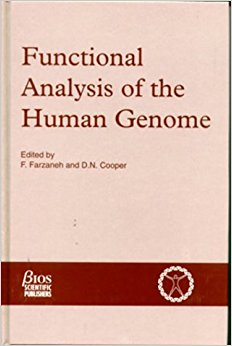Background
Farzaneh was born on August 19, 1953 in Teheran, Iran; the son of Ali and Mehri (Movsavian) Farzaneh. He arrived in the United Kingdom in 1970.








(As our understanding of the structure and organization of...)
As our understanding of the structure and organization of the human genome grows, studies which can yield insight into genome function become increasingly important. Functional Analysis of the Human Genome reviews the range of techniques currently available for the study of the relationship between structure and function, and assesses the strategies employed to ensure that each of these keeps pace with and complements the other. Topics covered include: human genome mapping; cloning transcribed genes; retroviral insertional mutagenesis; gene trapping; gene transfer and expression; integration of foreign DNA and DNA methylation; use of transgenic animals in human gene analysis; homologous recombination and its applications (including gene therapy); use of antisense oligonucleotides. Functional Analysis of the Human Genome is a timely and detailed account of this key area of study. Written by active researchers in the filed, the aim has been to produce a book which is both authoritative and succeeds in provoking genuine excitement about this topic. Experienced researchers and newcomers to the subject alike will find this volume to be essential reading.
http://www.amazon.com/gp/product/0122204344/?tag=2022091-20
1995
Farzaneh was born on August 19, 1953 in Teheran, Iran; the son of Ali and Mehri (Movsavian) Farzaneh. He arrived in the United Kingdom in 1970.
Farzaneh received a Bachelor of Science degree in 1976 and a Master of Science degree in 1977 from the University of Aberdeen. Two years later he was given a Doctor of Philosophy degree from the University of Sussex.
Farzaneh began his career as a beit memorial research fellow at laboratory of cell and molecular biology at the University of Sussex in 1979. Three years later he took a position of a european molecular biology organisation fellow of biochemistry department at the University of Amsterdam.
In 1983, Farzin became a medical research council fellow of the department of biochemistry and molecular biology at the University of Sussex. Then in 1985, he was appointed a professor of molecular medicine of the division of cancer studies at King's College of London and since 2004 he has hold the same position. Also in 1985, Farzaneh held the position of a senior lecturer at the same college. In 1993, he was a director of molecular medicine unit at King's College of London. Three years later Farzin took a position of a head of molecular medicine department at that college.
In 2004, he served as an honorary consultant in specialist medicine of the department of haematology at King's College Hospital NHS Foundation Trust. Then in 2006, Farzaneh took a position of a european editor of the Journal "Experimental Biology and Medicine".
(As our understanding of the structure and organization of...)
1995
Farzaneh is a member of Royal College of Pathologists, the Royal Society for the Encouragement of Arts, Manufacture and Commerce, the Society of Biology, American Association for the Advancement of Science, British Society of Development Biology, United Kingdom Molecular Biology Cancer Network, British Society of Genetics, American Society of Microbiology and New York Academy of Sciences.
He was a secretary general in 2001-2006 and president from 2007 to 2008 of the International Society for Cell and Gene Therapy of Cancer.
On April 4, 1985 Farzin Farzaneh married Lindsay Claire Stockley. They have 2 children.
